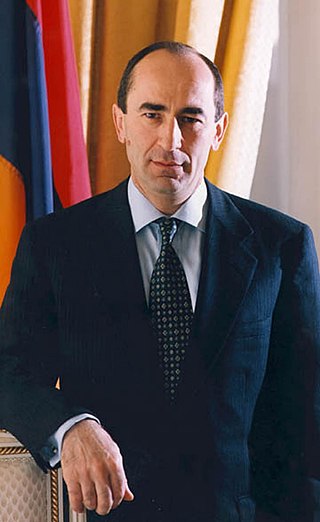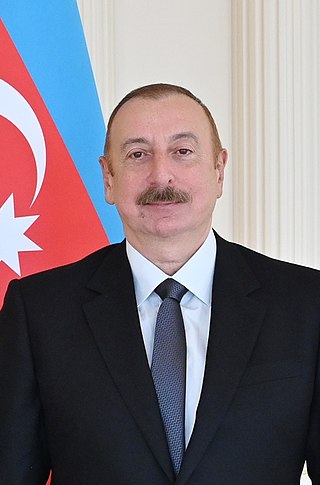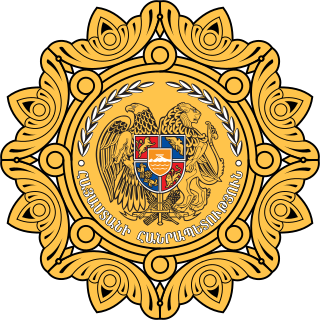 |
|---|
|
Local elections were held in Armenia on 11 March, 10 June, 24 June and 21 October 2018. [1]
Yerevan City Council elections were held on 23 September.
 |
|---|
|
Local elections were held in Armenia on 11 March, 10 June, 24 June and 21 October 2018. [1]
Yerevan City Council elections were held on 23 September.

The politics of Armenia take place in the framework of the parliamentary representative democratic republic of Armenia, whereby the President of Armenia is the head of state and the Prime Minister of Armenia the head of government, and of a multi-party system. Executive power is exercised by the President and the Government. Legislative power is vested in both the Government and Parliament.

Robert Sedraki Kocharyan is an Armenian politician. He served as the President of the Nagorno-Karabakh Republic from 1994 to 1997 and Prime Minister of Nagorno-Karabakh from 1992 to 1994. He served as the second President of Armenia between 1998 and 2008 and as Prime Minister of Armenia from 1997 to 1998.

Heydar Alirza oghlu Aliyev was a Soviet and Azerbaijani politician who served as the third president of Azerbaijan from October 1993 to October 2003. Originally a high-ranking official in the KGB of the Azerbaijan SSR, serving for 28 years in Soviet state security organs (1941–1969), he led Soviet Azerbaijan from 1969 to 1982 and held the post of First Deputy Premier of the Soviet Union from 1982 to 1987.

The Republican Party of Armenia is a national-conservative political party in Armenia led by the third president of Armenia, Serzh Sargsyan.

The Armenian Revolutionary Federation, abbr. ARF or ARF-D) also known as Dashnaktsutyun is an Armenian nationalist and socialist political party founded in 1890 in Tiflis, Russian Empire by Christapor Mikaelian, Stepan Zorian, and Simon Zavarian. Today the party operates in Armenia, Artsakh, Lebanon, Iran and in countries where the Armenian diaspora is present. Although it has long been the most influential political party in the Armenian diaspora, it has a comparatively smaller presence in modern-day Armenia. As of October 2021, the party was represented in three national parliaments with ten seats in the National Assembly of Armenia, three seats in the National Assembly of Artsakh and three seats in the Parliament of Lebanon as part of the March 8 Alliance.

Artsakh, officially the Republic of Artsakh or the Nagorno-Karabakh Republic, is a breakaway state in the South Caucasus whose territory is internationally recognised as part of Azerbaijan. Artsakh controls a part of the former Nagorno-Karabakh Autonomous Oblast, including the capital of Stepanakert. It is an enclave within Azerbaijan. Its only overland access route to Armenia is via the 5 km (3.1 mi) wide Lachin corridor which is under the control of Russian peacekeepers.

The Democratic Party of Armenia is a democratic socialist political party in Armenia. It was established in 1991 by Aram Gaspar Sargsyan, the last secretary of the Soviet-era Communist Party of Armenia when the party ruled the Armenian Soviet Socialist Republic from 1920 until 1990.

Serzh Azati Sargsyan is an Armenian politician who served as the third President of Armenia from 2008 to 2018, and twice as the Prime Minister of Armenia from 2007 to 2008 and again from 17 to 23 April 2018, when he was forced to resign in the 2018 Armenian revolution.

Armen Vardani Sarkissian is an Armenian politician, physicist and computer scientist who served as the 4th president of Armenia from 9 April 2018 to 1 February 2022. He served as Prime Minister of Armenia from 4 November 1996 to 20 March 1997 and was the country's longest-serving ambassador to the United Kingdom from 1998 to 2018. Sarkissian was elected on 2 March 2018 and assumed the presidency on 9 April 2018. He resigned on 23 January 2022. Sarkissian gave a reason for his resignation saying that the country’s constitution does not give the president sufficient powers to influence events.

Devlet Bahçeli is a Turkish politician, economist, former deputy prime minister, and current chairman of the far-right, ultranationalist Nationalist Movement Party (MHP).

Republic Square is the central town square in Yerevan, the capital of Armenia. It consists of two sections: an oval roundabout and a trapezoid-shaped section which contains a pool with musical fountains. The square is surrounded by five major buildings built in pink and yellow tuff in the neoclassical style with extensive use of Armenian motifs. This architectural ensemble includes the Government House, the History Museum and the National Gallery, Armenia Marriott Hotel and two buildings that formerly housed the ministries of Foreign Affairs and Transport and Communications. The square was originally designed by Alexander Tamanian in 1924. The construction of most of the buildings was completed by the 1950s; the last building—the National Gallery—was completed in 1977.

Nikol Vovayi Pashinyan is an Armenian politician serving as the prime minister of Armenia since 8 May 2018.

Ilham Heydar oghlu Aliyev is the fourth president of Azerbaijan, serving in the post since 31 October 2003.

Women in Armenia have had equal rights, including the right to vote, since the establishment of the First Republic of Armenia. On June 21 and 23, 1919, the first direct parliamentary elections were held in Armenia under universal suffrage - every person over the age of 20 had the right to vote regardless of gender, ethnicity or religious beliefs. The 80-seat legislature, charged with setting the foundation for an Armenian state, contained three women deputies: Katarine Zalyan-Manukyan, Perchuhi Partizpanyan-Barseghyan and Varvara Sahakyan.

The president of Armenia is the head of state and the guarantor of independence and territorial integrity of Armenia elected to a single seven-year term by the National Assembly of Armenia. Under Armenia's parliamentary system, the president is simply a figurehead and holds ceremonial duties, with most of the political power vested in the Parliament and prime minister.

The dissolution of the Soviet Union was the process of internal disintegration within the Soviet Union (USSR) which resulted in the end of the country's and its federal government's existence as a sovereign state, thereby resulting in its constituent republics gaining full sovereignty on 26 December 1991. It brought an end to General Secretary Mikhail Gorbachev's effort to reform the Soviet political and economic system in an attempt to stop a period of political stalemate and economic backslide. The Soviet Union had experienced internal stagnation and ethnic separatism. Although highly centralized until its final years, the country was made up of fifteen top-level republics that served as homelands for different ethnicities. By late 1991, amid a catastrophic political crisis, with several republics already departing the Union and the waning of centralized power, the leaders of three of its founding members declared that the Soviet Union no longer existed. Eight more republics joined their declaration shortly thereafter. Gorbachev resigned in December 1991 and what was left of the Soviet parliament voted to end itself.

The 2018 Armenian Revolution, most commonly known in Armenia as #MerzhirSerzhin, was a series of anti-government protests in Armenia from April to May 2018 staged by various political and civil groups led by a member of the Armenian parliament — Nikol Pashinyan. Protests and marches took place initially in response to Serzh Sargsyan's third consecutive term as the most powerful figure in the government of Armenia and later against the Republican Party-controlled government in general. Pashinyan declared it a Velvet Revolution.

Snap parliamentary elections were held in Armenia on 9 December 2018, as none of the parties in the National Assembly were able to put forward and then elect a candidate for Prime Minister in the two-week period following the resignation of incumbent Prime Minister Nikol Pashinyan on 16 October. They were the first elections after the 2018 revolution and the country's first-ever snap elections.

Snap parliamentary elections were held in Armenia on 20 June 2021. The elections had initially been scheduled for 9 December 2023, but were called earlier due to a political crisis following the 2020 Nagorno-Karabakh War and an alleged attempted coup in February 2021.

The European Party of Armenia is a pro-European political party in Armenia. It was founded on 6 November 2018 by film-maker Tigran Khzmalyan.